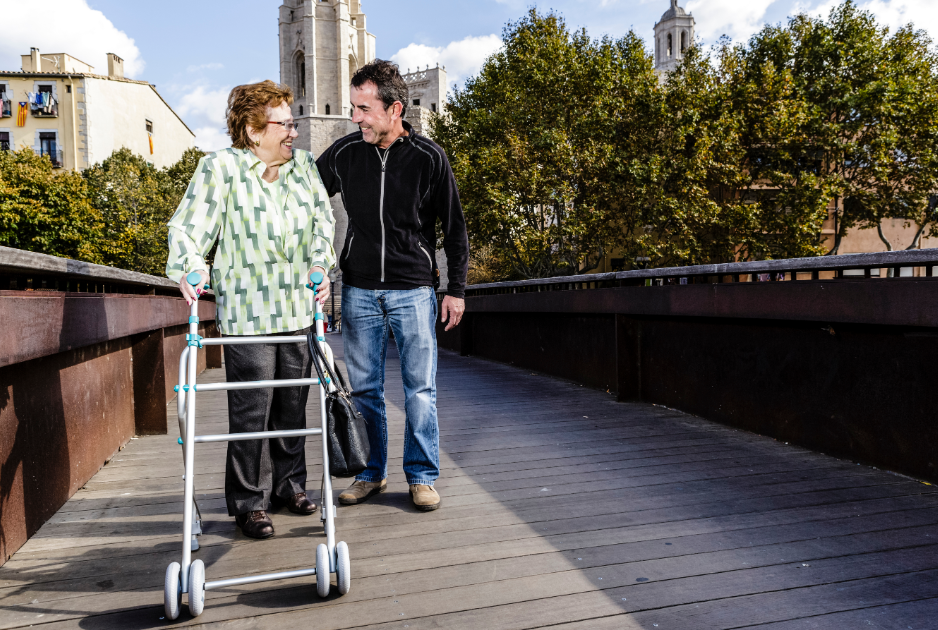Dutch 'dementia village,' a whole neighborhood designed for memory loss, is a game-changer
The Hogeweyk provides a sense of "normalcy" for people living with dementia.
People with dementia can roam freely in a dementia village.
There are a lot of extremely challenging things about getting older, but one stands about the rest. Living with dementia is not easy, nor is living with someone living with dementia. No matter how much caregivers may want to keep a loved one with dementia in their home, it's not always feasible. But moving them into a traditional care facility isn't always ideal, either.
That's where a "dementia village" comes in as an alternative. Instead of trying to fit a person with dementia into a living situation that either isn't designed for them or is overly focused on their limitations, a dementia village is an environment designed specifically to help people with severe dementia feel safe and free and live as normal a life as possible.

The Hogeweyk was the world's first dementia village, founded in 2009. Since then, the idea has been replicated in dozens of locations all over the world. The concept is quite simple: A full, self-contained neighborhood where people with dementia can walk around freely without fear of getting lost, where everyone from shopkeepers to restaurant servers to salon workers are trained in dementia care, and where people who are losing their memory to dementia diseases are treated as people who still have aspirations.
Eloy van Hal, one of the founders of the Hogeweyk, explained to Vox how the guiding principle of the village is "normalcy." Traditional nursing homes keep all residents under one roof, and they are subject to do whatever program the institution provides for them. In the Hogeweyk, people live in small groups of six or seven in apartments with furnishings like they'd have at home. Distinct landmarks in the public space help residents know where they are, and putting a theater, grocery store, barber shop, etc. in separate buildings encourage movement through the neighborhood.
"It's about choice, choice, choice, where you want to be during the whole day and with whom," said van Hal. The idea is to balance safe design with controlled risk, allowing for as much of a normal life as possible.
- YouTube youtu.be
The one downside to the village concept, of course, is cost. Without adequate funding assistance from governments, living in a dementia village can be prohibitively expensive.
Does it really make a difference for residents, though? Has it been proven that outcomes are better than traditional care models? With dozens of villages now being used around the world, research is ongoing but the data from the Hogeweyk is promising. People in the comments of Vox's by Design video shared how such facilities have been life-changing for their loved ones and how traditional care doesn't always meet the needs of people with dementia.
"My grandmother had dementia and when her caretaker who was my grandfather (her husband) passed unexpectedly we had to scramble to get her into a memory care facility in the US. The first place she was in temporarily was so sad, I could see her spirit drain but after about a year we were able to get her into a "village" and the quality of life difference is nothing short of ASTOUNDING! She could function in a way that was familiar and comfortable to her and not be in a foreign hospital setting. The abrupt change from a home where they are familiar, to a clinical setting must be very disorienting and upsetting to these people. That side of my family had mental health issues and memory loss starts early, so I know it will happen to me to some extent and I only hope I can have people take care of me as well as in this Hogeweyk."
"I've worked in a nursing home through high school and college. While I can't say it was the worst place for dementia patients, it certainly did not work well for all of them. One patient once tried to wedge herself through the door begging to go outside with me and I even had patients confide in me that they hated being institutionalized, they missed being able to live a normal life, being part of a real community, and being able to come and go as they pleased. This concept is probably the closest thing possible to a normal life a dementia patient could ever have."

"A relative of mine used to get aggressive, violent and angry when she would encounter a locked door in the institution she was in. She couldn't understand why there would be a locked room in what she understood to be 'her home', this would take a lot of calming down and management, only for her to discover another locked door, and kick off again. I love these village based models as they allow autonomy for residents, and have an individual experience. Just because someone has a brain disease doesn't mean they aren't entitled to the very best care. I hope the govt spends far more on these establishments in the future."
"As he said at the end, people with dementia are still people—even if there is proven to be no benefits to this model over a care home, I would much prefer to have dignity in my final days than live in a clinical trap. Love all the incredible ideas the Netherlands come up with."
Dementia care is something Americans are going to have to look at closely. According to The Alzheimer's Association, the number of people living with Alzheimer's is set to nearly double from seven million to 13 million by the year 2050. As more of our elders require full-time care, the more we'll have to consider prioritizing putting resources into things like dementia villages.
Everyone deserves safety and a good quality of life. The Hogeweyk is a great example of what it looks like to view people with dementia as people first and to care for them accordingly.
This article originally appeared in April. It has been updated.
